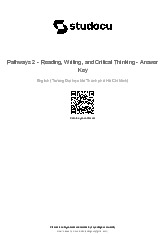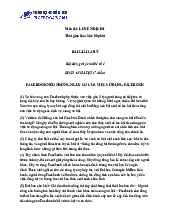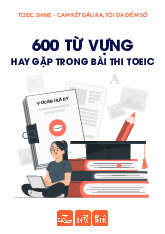

Preview text:
Life
You mustn’t take so many clothes!
We both agreed not to pack much.
Don’t forget your passport!
Let’s not take any sun screen. We can buy
some there.
Presentation

I hope so!
You don’t have to bring the diving gear.
Me neither.
I don’t think it’s a good idea to change money at the airport.
Do you think it’s going to be very hot?
I haven’t packed much.
Negative statements with think, believe, suppose, imagine and want:
Upper Intermediate Unit 6a
Negative forms
It’s more common to make the first verb in the sentence negative, not the second: I don’t think it’s a good idea.
Negative forms of have to and must:
Have to and must have a similar meaning in positive sentences. However, mustn’t and not have to have completely different meanings.
You mustn’t take so many clothes. (= Don’t do it!)
You don’t have to take any sun screen. (= You can if you want, but it isn’t necessary.)
Negative short answers with hope, expect, believe, guess, suppose and be afraid:
Add not after the verb:
‘Is it going to be very cold?’ ‘I hope not.’
The affirmative equivalent is so, e.g. I’m afraid so.
Negative imperatives:
Use don’t to make an imperative negative. It is the same for one person or more than one: Don’t forget your passport.
Negative infinitive:
Add not before to to make an infinitive with to negative:
We both agreed not to pack much.
Negative suggestions:
Use let’s not + infinitive to make a negative suggestion:
Let’s not take any sun screen.
Negative words: neither, none, no, not ... either
We use no directly before a plural or uncountable noun in a sentence with a positive verb: There are no tourists at this time of year.
We can’t use no if there is an article or possessive adjective before the noun. Use none of instead: None of the hotels had empty rooms.
None is a pronoun. We use it in place of a noun to say ‘not one’ or ‘not any’: There were six hotels when I was a child. There are none now.
We use neither + auxiliary verb + pronoun to agree with a negative statement. It means ‘also not’.
‘I don’t like hot weather.’ ‘Neither do I.’
The affirmative equivalent is so (So do I).
We can also use pronoun + neither with the same meaning.
‘I don’t like this place.’ ‘Me neither.’
The affirmative equivalent is too (Me too).
We also use not ... either with the same meaning.
‘I don’t feel like going out.’ ‘I don’t either.’
Exercises
- Complete the sentences with the words.
imagine decided forget hope mustn’t neither none of not
- I don’t imagine that we’ll hear from them again.
- You take liquids on the plane. It’s against the law.
mustn't
- A: Is Geoff coming too?
B: I not! We don’t get on.
hope
- Don’t to call me
forget
when you get there so I know you arrived safely.
- Choose the correct options.
- This place used to be famous for its hotels. But now there are no / none left.
- A: I really don’t like the way people speak to you in this hotel.
B: Me neither. / Me either.
- A: Is there a bank near here? I need to change some money.
B: I’m afraid not / so.
- They not to go by train. They hired a car instead.
- Let’s stay out so late tonight. I’m tired.
not
decided
- us like holidays on hot beaches.
None of
- A: I like this country but the food is very hot. I can’t eat it.
B: can I.
neither
- I suppose / don’t suppose it’s a good idea to stay up late because our flight leaves very early.
- A: We don’t want to go away this year on holiday.
B: We don’t either / neither.
- We planned to spend / not to spend too much time on buses, but we did.
- Complete the second sentence so it has the same meaning as the first.
Upper Intermediate Unit 6a
Exercises
- I think it’s a bad idea.
don’t I don’t think it’s a good idea.
- It’s against the rules to carry over 25kg on the plane.
mustn't carry
mustn’t You over 25kg on the plane.
- You can bring diving gear but you won’t need it.
have to You diving gear.
not have to bring
- Remember to check in 24 hours before your flight.
don't forget check in
forget 24 hours before your flight.
- We all said that we didn’t want to meet at the same restaurant as last time.
agreed not meet
agreed not We at the same restaurant as last time.
- I don’t think we should go back to the city.
Let's go back
let’s to the city.
- Me neither.
do I
do Neither .
- In my opinion the answer is wrong.
believe the answer is right.
I not believe that
- Imagine you are planning a holiday with some friends. Complete these sentences about your plans.
- Me and my friends have agreed not to .
go to the zoon on this holiday
- None of my friends .
know how to baking a cake
- I don’t imagine .
that we'll lose luggages at airplane
- We hope not to .
to spend a lot of moneys in sourvenir




